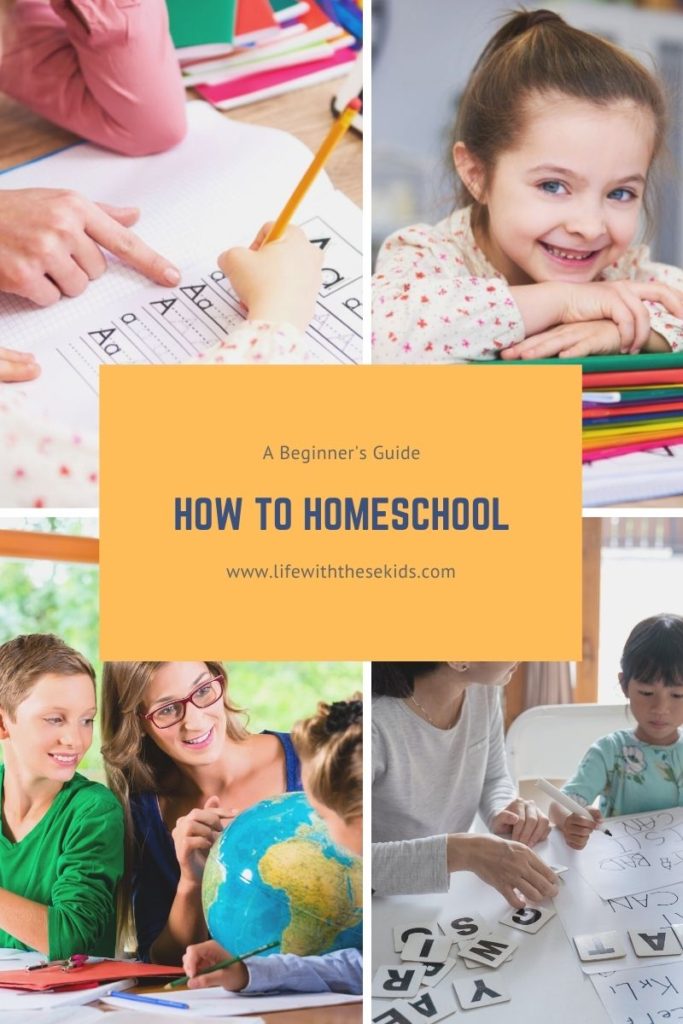As a veteran homeschool mama of many, I’m often asked about how to get started homeschooling. This post is written to answer all the questions, or at least as many as I can fit into a single blog post.
Continue reading to glean from my 20+ years of experience as a homeschool mom.

Why Homeschool?
Educating your children is important, no matter how you decide to get it done. Homeschooling gives parents the opportunity to lay a firm foundation for their children, not only academically but homeschool parents also have the opportunity to influence their children’s worldview.
Although our list of reasons for homeschooling has grown and changed through the years, it’s great to keep a running list to remind yourself why you chose this when things get hard. And believe me, things will get hard.
Nothing is all sunshine and rainbows, especially dealing with your own sin nature replicated in your offspring, but I digress…
Here’s a short list of some of our top reasons for homeschooling.
- More time with our kids.
- Shape their worldview.
- Inspire a love of learning.
- Teach our children to teach themselves/how to learn.
- Point our kids to Christ.
- Enjoy Freedom! (Time freedom, curriculum freedom, etc.)
What Homeschooling Is and What It Isn’t
There are many misconceptions about homeschooling floating around, so let’s clear the air with a quick list of what homeschool is and isn’t.
Homeschooling is not:
- 8 hours of school, 5 days a week.
- rote memorization.
- a guarantee that your children will succeed in life.
- public school at home.
- always easy.
Homeschooling is:
- An opportunity to spend time with your children.
- Personalized education.
- Flexible.
- Freedom.
- Absolutely worth it!
So now that those misconceptions are cleared up, we can get to the good stuff.
How to Start Homeschooling
Getting started homeschooling is as simple as making the decision to do so. If your child is enrolled in public or private school, you may need to formally withdraw them. Otherwise, you simply begin learning at home. As the parent, you decide when and how to homeschool.
A word of caution: If your child has spent much time in a traditional school setting, give them time to de-school before you attempt to begin your homeschool program. They’ll need time
Choosing Curriculum
Of course, you’ll probably want to choose a curriculum to use. I mean, after all, do you remember how to label a cell, when the Battle at Bunker Hill occurred, or how to do calculus? Teacher’s manuals are great for this!
Learning Styles Matter
Before you look at curriculums, I suggest you take the time to read The Way They Learn by Cynthia Ulrich Tobias. A quick perusing of this book will help you understand not only how your kids learn, but also how you learn. And that will help you decide what type of curriculum you’re looking for.
For the auditory learner, a curriculum rich in hands-on projects will probably not produce the results you’re looking for. But a curriculum full of good audiobooks and videos will. And likewise, a ton of textbooks/workbooks will be frustrating for the kinesthetic learner. Let him build something, draw something, or otherwise create something related to his studies.
Curriculum Fairs are Helpful
Once you’ve identified your learning style and that of your children, you’ll be ready to look at curriculum. If you have the opportunity, I suggest you visit a curriculum fair where you can put your hands on different curriculums and ask questions about the publisher’s representatives.
If a curriculum fair is not possible where you are, the internet is the next best thing. It is very easy to get overwhelmed with all of the choices available to us today which is why I recommend reading The Way They Learn first. Don’t even LOOK at curriculums that don’t fit your family’s learning style.
Search for only those curriculums that fit your family’s learning style. Read reviews from other homeschool families, look for blog posts and vlog posts to get as much information as possible before you make your purchase.
Make your purchase knowing that there is no such thing as a perfect curriculum. There may be parts that you don’t like. That’s okay. Make it work for your family, and don’t feel guilty skipping parts that don’t bless your homeschool.
Don’t Reinvent the Wheel
The second book I recommend is Things We Wish We’d Known by Bill & Diana Waring. The Warings compiled testimonials from dozens of veteran homeschool families to share things they wish they’d known earlier in their homeschooling careers.
There is so much wisdom to be gleaned from others’ experiences, I suggest you save yourself a lot of headache and maybe even a little heartache by learning from those who’ve gone before you.
Establish a Routine
Hear me, please. DO NOT attempt to replicate a public school schedule within your home, but DO establish a regular routine that your children can depend on. Meal times, lesson times, and chore times should all be completed about the same time every day.
Notice I’m not talking about strict, stringent schedules. Those things suck the joy right out of your day, but dependable routines help the whole family stay on track and get the important tasks done consistently.
How to Homeschool Legally
While homeschooling is legal in all 50 states, be sure to check your individual state laws to make sure you’re in compliance. Some states require you “register” your children with a local truancy officer while others require no reporting at all.
Our state (MS) requires registration from ages 6-17 and 180 days of school, but we don’t have to report those 180 days to anyone. Other states require yearly portfolios or academic testing.
If you’re unsure about your state’s homeschool laws, Homeschool Legal Defense Association (HSLDA) has a quick reference map on their website you may find helpful.
Other Commonly Asked Questions
What About Socialization?
I probably asked this question myself about 20 years ago, but I now know my concerns were unfounded. Unless you live in a bubble and refuse to socialize outside your own home, there are a myriad of socialization opportunities available to you and your children. Homeschool groups and co-ops, church, sports teams, art classes, gymnastics, or dance classes all provide opportunities for homeschoolers to socialize.
Will He/She Be Able to Go to College?
In a word, Yes! If he or she wants to attend college, that is. Most schools only require a printed transcript of the student’s high school courses and credits along with a minimum ACT score that is required for every new enrollment. Some colleges know that homeschoolers have a good reputation for being good students and actively seek them out.
If your child is college-bound, be sure to check with the school he plans to attend to see what they require for new enrollees.
Do You Have to Be a Certified Teacher to Homeschool?
Absolutely not! I’m not aware of any state that requires a teaching certification to teach your own children. Most homeschool curriculums are written with a parent in mind, not a teacher, and as such, they’ve done a good job of creating products that any parent can use.
What’s the Best Curriculum?
The answer to this question is as varied as the people reading this. There are hundreds, if not thousands, of homeschool curriculum options available today. I always suggest that new homeschoolers at least make an attempt to determine their learning style as well as that of their children. It makes curriculum purchasing mistakes much less common.
Tips for Homeschool Success
- Be committed. Homeschooling is a marathon, not a sprint.
- Don’t try to duplicate public school at home. This will frustrate everyone involved.
- Teach to your child’s strengths.
- Hire a tutor if/when necessary. It’s okay if you can’t teach everything.
- Create a daily routine. This will look different in every season, but a routine is an invaluable tool.
- Teach life skills. Your kids may not appreciate it now, but they’ll thank you for teaching them to cook, clean, and handle routine household chores.
- Don’t expect too much of yourself or your children. Unrealistic expectations are destructive. Do your best!
- Let your kids explore their own interests. Learning should be fun. Homeschooling makes it possible!
- Take field trips. And take lots of pictures.
- Learn to relax and have fun. Make beautiful memories with your children.


